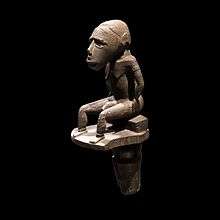Dakuwaqa
In Fijian mythology, Dakuwaqa (Dakuwanga) is a shark-god.[1] He was greatly respected by fishermen[2] because he protected them from any danger at sea[3] and sometimes protected them from evil denizens of the sea.[4]

He was once going inland to conquer Kadavu Island[5] through the river when another goddess[6] challenged him in the form of an octopus.[7] After a great battle, the octopus won by pulling out his teeth with her 8 arms which enabled her to hold off the massive attack of Dakuwaqa, forcing Dakuwaqa to promise to never attack Kadavu again. That is how Dakuwaqa became the god and protector of Kadavu. Dakuwaqa can also change shape into anything, but his real form is that of a muscular Fijian man with the upper torso of a shark.[8]
In the book Pacific Irishman, the Anglican priest Charles William Whonsbon-Aston records in Chapter 1, Creation:[9]
When I came to Fiji the famed fish-god, the Dakuwaqa, was very much a reality. The Government ship, the Lady Escott, reached Levuka with signs of an encounter with the great fish, while the late Captain Robbie, a well known, tall, and very erect Scot, even to his nineties, told of the sleepy afternoon as his cutter was sailing from his tea estate at Wainunu, under a very light wind, with most of the crew dozing. A great fish, which he described as near 60 feet in length, brown-spotted and mottled on its back, with the head of a shark and the tail of a whale, came up under his ship, almost capsizing it.
The crew, instantly awake and concerned, followed the ancient pattern, pouring a strong libation of kava into the sea, which, it would seem, was just the right idea for placating fish-gods; the monster slowly submerged, the breeze gradually gathered the cutter away, its keel dragging along the monster's back, making the skin pale.
To the Fijian crew this was the "Dakuwaqa"--in the twentieth century; what must have been the effect in the tenth?
In popular culture
American writer Jeff VanderMeer wrote a story about Dakuwaqa that can be found in his book, The Third Bear.[10]
Dakuwaqa is featured and recreated in the third episode of the TV miniseries Beast Legends.
Dakuwaqa is the father of the famous villain "King Shark" of DC Universe.
See also
References
- Fijian Medicinal Plants by RC Cambie, J Ash
- Bed the turtle softly: legends of the South Pacific by Mary Edith Branham and Joel S. Branham. "Many are the stories about the shark-god Dakuwaqa."
- Deuba: A Study of a Fijian Village by William Robert Geddes
- The People of the Sea: Environment, Identity, And History in Oceania. Author: Paul D'Arcy. Please see this page. "His Fijian crew addressed the creature as Dakuwaqa, and promised it kava if it did not harm them. Dakuwaqa had a history of fierce retribution against seafarers who did not respect him, but had rescued his worshippers from trouble at sea."
- Fiji by Dean Starnes, Nana Luckham. Featuring more diving information than many other guides, this work also includes options for sustainable travel, comprehensive trip itineraries.
- She is everywhere! : an anthology of writings in womanist/feminist spirituality by Mary Saracino. According to Mary Saracino, the great octopus was a goddess.
- Dakuwaqa The Shark God. Archived 2012-01-28 at the Wayback Machine "One of the best known gods in Fijian legends is the fierce sea-monster Dakuwaqa. He was the guardian of the reef entrance of the islands, fearless, headstrong and jealous. He frequently changed himself into the form of a shark and travelled around the islands fighting all the other reef guardians."
- The Fierce Sea God
External links
